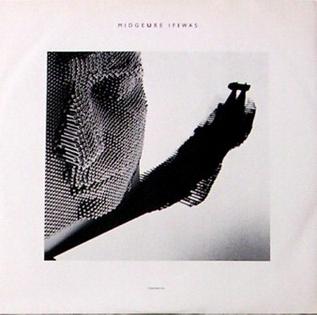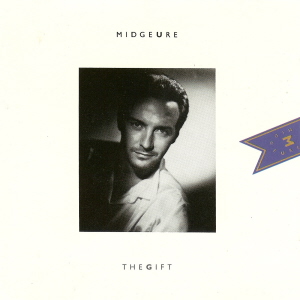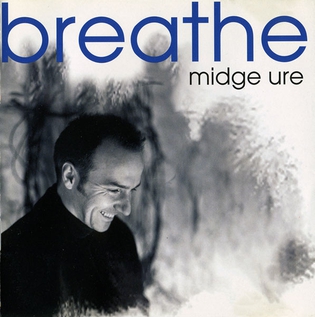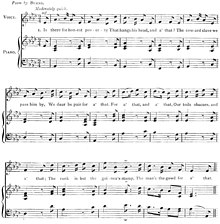
James "Midge" Ure is a Scottish musician, singer-songwriter and record producer. His stage name, Midge, is a phonetic reversal of Jim, a hypocorism of his given name. Ure enjoyed particular success in the 1970s and 1980s in bands including Slik, Thin Lizzy, Rich Kids and Visage, and as the second frontman of Ultravox. In 1984, he co-wrote and produced the charity single "Do They Know It's Christmas?", which has sold 3.7 million copies in the UK. The song is the second-highest-selling single in UK chart history. Ure co-organised Band Aid, Live Aid and Live 8 with Bob Geldof. He acts as a trustee for the charity and also serves as an ambassador for Save the Children.
Jacobite Relics is a two volume collection of songs related to the Jacobite risings, compiled by the Scottish poet and novelist James Hogg on commission from the Highland Society of London in 1817. Most of the songs in the collection are Jacobite, and a minority are Whig. A number of the songs were written or adapted by Robert Burns and scholars speculate as to how many of them were authored or at least substantially altered by Hogg himself.

George Thomson was a Scottish music publisher and a friend of Robert Burns. He was clerk to the board of trustees in Edinburgh for 60 years. His A Select Collection of Original Scottish Airs for the Voice came out in six volumes between 1793 and 1841, and included contributions from Burns, Lord Byron, Thomas Moore, Walter Scott and Thomas Campbell. Thomson published folksong arrangements by Joseph Haydn, Ludwig van Beethoven, Ignaz Pleyel, Leopold Kozeluch, Johann Nepomuk Hummel, Carl Maria von Weber, Henry Rowley Bishop, and Robert Archibald Smith.

"Vienna" is a song by British new wave band Ultravox from their 1980 fourth studio album of the same name. It was released as the album's third single on 9 January 1981 by Chrysalis Records and features Midge Ure singing the lead vocal.
"A Red, Red Rose" is a 1794 song in Scots by Robert Burns based on traditional sources. The song is also referred to by the title "(Oh) My Love is Like a Red, Red Rose" and is often published as a poem. Many composers have set Burns' lyric to music, but it gained worldwide popularity set to the traditional tune "Low Down in the Broom"
The McCalmans were a Scottish folk trio. Formed on 6 October 1964, they recorded and toured without interruption until they disbanded in December 2010. Their performance was based on three part harmony, humour and a deep love and respect for the folk tradition in Scotland. They performed all over Europe, and in the United States, Canada, Australia, New Zealand, Bermuda, Kenya, Cyprus, Belize and the Falkland Islands. They had six television series and BBC Network Radio series and appearances.

"If I Was" is a song by Scottish musician Midge Ure. It was co-written by Ure and Danny Mitchell and released as the first single from Ure's debut solo studio album, The Gift (1985). The song reached No. 1 on the UK Singles Chart for one week in September 1985. The track also reached number one in Ireland and peaked within the top 20 in eight other countries.

Lament is the seventh studio album by British new wave band Ultravox, released on 6 April 1984 by Chrysalis Records. It was the last album featuring original drummer Warren Cann until the band's reunion album Brilliant in 2012. The album peaked at number eight on the UK Albums Chart and was certified gold by the British Phonographic Industry (BPI) on 8 June 1984 for shipments of 100,000 copies. It also reached number 25 in Germany and number 115 in the United States.

"Dancing with Tears in My Eyes" is the second single from Lament, Ultravox's seventh studio album, released on 11 May 1984.

The Gift is the debut solo studio album by Scottish musician Midge Ure, released on 7 October 1985 by Chrysalis Records. It was released while his band Ultravox were taking a break; the band would go on to release U-Vox (1986) before breaking up. The album reached No. 2 in the UK Albums Chart partly due to the large attention drawn to it by the single "If I Was" which reached No. 1 on the UK Singles Chart in September 1985. "That Certain Smile" was released as the second single in November 1985, and "Wastelands" was released as the third single in January 1986.

"No Regrets" is a song by folk and blues singer/songwriter Tom Rush. It is the final song on his 1968 album The Circle Game and was released as a single in the UK in January 1968 and in the US in April. It peaked at number 57 on the UK BMRB Breakers, an official extension of the UK Singles Chart.
"Oh, whistle and I'll come to you, my lad" is the title and refrain of a poem and song by Robert Burns, first written in 1787, and then expanded in 1793.

Robert Burns, also known familiarly as Rabbie Burns, was a Scottish poet and lyricist. He is widely regarded as the national poet of Scotland and is celebrated worldwide. He is the best known of the poets who have written in the Scots language, although much of his writing is in a "light Scots dialect" of English, accessible to an audience beyond Scotland. He also wrote in standard English, and in these writings his political or civil commentary is often at its bluntest.
Jean Glover or Jennifer Glover (1758–1801) was a Scottish poet and singer. She was the daughter of James Glover, handloom weaver and Jean Thomson, born in Townhead, Kilmarnock; was well educated for the time she lived in, clever and sharp-witted. She had a fine singing voice and exceedingly good looks of "both face and figure".
"I Feel Like Buddy Holly" is a song recorded by Alvin Stardust in 1984, written and produced by Mike Batt. The song spent 11 weeks on the UK Singles Chart, reaching number 7 in 1984. The single was released on Chrysalis Records, and included the song "Luxury" on the B-side, which was written and produced by Alvin Stardust.
A Select Collection of Original Scottish Airs for the Voice is a multi-volume collection of Scottish song edited and published by the entrepreneurial musician, publisher and Clerk to the Board of Trustees for Encouragement of Art and Manufacture in Scotland, George Thomson. For the first volume, which appeared in 1793, Thomson commissioned the composer Ignaz Pleyel to provide musical settings. He subsequently expanded his scheme throughout his life in further volumes and editions.
Sheena Wellington is a traditional Scottish singer. She is best known for performing the Robert Burns song A Man's A Man For A' That at the opening ceremony of the Scottish Parliament in 1999.

Breathe, a 1996 album by Midge Ure, was the fourth solo release for the former Ultravox frontman. The album, produced by Richard Feldman, was released first in Continental Europe, followed by the U.K. and U.S.
Jean Lorimer (1775–1831) was a friend of the poet Robert Burns, often referred to by him as the "Lassie wi' the lint-white locks" or "Chloris". Lorimer was born at Craigieburn House on a small estate near Moffat and from 1788 to 1791 was a neighbour of Burns when he was living at Ellisland Farm, her father's new farm being at Kemmishall or Kemys Hall, Kirkmahoe Parish, two miles to the south of Ellisland on the opposite bank of the Nith. Burns commented "The Lady on whom it was made, is one of the finest women in Scotland" in a letter to George Thomson, enclosing one of the two dozen or so songs that he wrote for her. They first met when she was a teenager through his excise duties bringing him to their farm.

Edward Whigham (1750–1823) was the landlord of a coaching inn, a bailie, Provost of Sanquhar, bibliophile and one of Robert Burns's close friends during his Nithsdale and Dumfries days. Edward married Jane Osborne who died on 6 October 1846.












